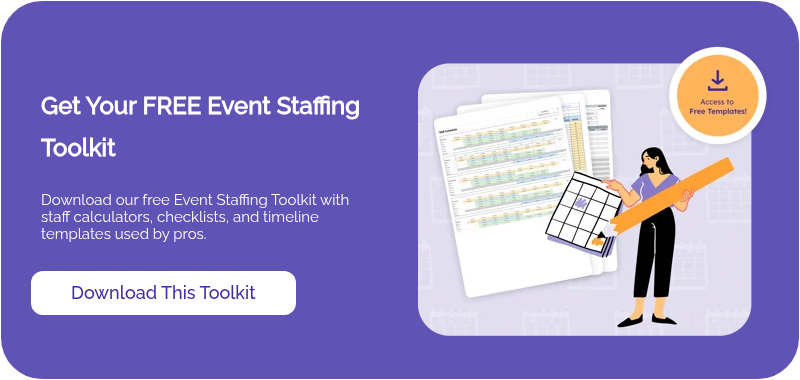When you're preparing to plan an unforgettable event, aiming to create lasting memories for everyone involved, you'll realize that numerous components must align to make it successful. From brainstorming the initial concept to finalizing details in the post-event glow, every step requires your full attention. But amidst all the moving parts, there's a crucial aspect: event logistics. It's where careful planning meets the hands-on work, ensuring every detail falls into place perfectly.
As the event industry continues to evolve, the demand for seamless execution grows exponentially.
One event planning statistic that stands out: By 2028, experts project that the global event industry could surpass a staggering $2 trillion, underscoring the immense potential and significance of mastering event logistics.
In this blog, we'll delve deep into the intricacies of event logistics, equipping you with the knowledge and tools needed to execute flawless events that leave a lasting impression. Ready to ensure your next event runs without a hitch? Read on.
Key Takeaways
- Strategic event logistics planning is essential for flawless event execution. It encompasses venue selection, transport solutions, and tech readiness and aims to enhance the attendee experience and meet stakeholder expectations.
- Detailed event planning includes setting clear goals and a comprehensive timeline, establishing a solid financial foundation with a structured budget, assembling a qualified team with defined roles and responsibilities, and providing customer service training.
- Post-event activities are crucial for future success, involving thorough venue walkthroughs, collecting and analyzing feedback, and applying lessons learned to improve subsequent events, complemented by leveraging event management software for efficiency.
The Essentials of Event Logistics
As an event planner, your primary objective is to create exceptional experiences that leave attendees satisfied and eagerly discussing the event on their way home. To achieve this, you need to effectively manage the logistics, covering both the physical and strategic aspects of event planning.
Key components include:
Venue Selection
We all know how important first impressions are, and that’s why a well-selected venue sets the tone for your entire event. When scouting locations, think about more than space and accessibility. Consider the vibe and atmosphere, too. You want a place that matches your event's vibe, whether it's upscale elegance or casual chic.
Catering Arrangements
Events are often opportunities for guests to mingle, chat, and enjoy themselves, but serving delicious appetizers and meals can bring a smile to everyone’s face. It’s important to work with caterers who understand your vision and can create menus that cater to everyone's tastes and dietary needs. From fancy sit-down dinners to trendy food stations, the food should be as memorable as the event itself.
Networking Opportunities
Let's face it—connections matter. That's why you want to create opportunities for meaningful interactions among your attendees. Depending on the type of event, plan structured networking sessions, engaging discussions, or fun activities that get people talking and expanding their network. After all, the relationships forged at your event have the potential to endure long after it's concluded.
Technological Setups
When it comes to your technological setup, precision is key. Make sure your audiovisual setup is on point, with clear sound and crisp visuals. Don't skimp on the tech gadgets, either. Whether it's incorporating live polls, interactive displays, or virtual reality experiences, successfully integrating the latest technology can enhance your event and provide attendees with a more enriching experience.
Moreover, leveraging event staff management software and communication tools is vital for ensuring smooth operations from start to finish.
The importance of managing the flow of logistics and operations cannot be overstated. The event must run smoothly from start to finish. A well-planned logistics strategy, developed in collaboration with key stakeholders, lays the foundation for a successful event.
By aligning goals and visions, this strategy ensures a seamless experience that meets stakeholder expectations.
But how do we begin to implement this strategy? Let's take a closer look at some key aspects of event logistics.
Deciding on a Strategic Venue
When it comes to events, the event venue isn't just a place; it's an experience.
Choosing a venue that reflects the event's theme and objectives contributes to an immersive and memorable event experience. But it's not just about aesthetics. Practical considerations are equally important.
Here are some factors to consider when choosing a venue:
- The venue should comfortably accommodate the estimated number of guests.
- The venue should support a good flow of traffic.
- It should ideally be in a location that is easily accessible to attendees, considering public transportation options and parking availability.
To ensure that the selected venue aligns with your event's needs, you'll need to evaluate venue services like in-house catering options, technological amenities, and eco-friendly practices.
Additionally, never underestimate the power of a personal site visit. It presents an opportunity to discuss logistics with the venue manager and carefully review the event contract for terms and conditions, including cancellation policies and additional fees.
Choosing Different Types of Transport
Transportation is another crucial part of event logistics management.
It encompasses a variety of travel needs such as interstate, intercity, international travel, and shuttle cabs, taking into account attendee-specific needs, accessible transportation, parking availability, and public transportation options.
Understanding your guests' transportation needs is essential for seamless event planning. This includes gathering details such as arrival and departure times, pick-up locations, necessary stops, and any special requirements they may have. Armed with this knowledge, you can craft a comprehensive transportation plan that outlines routes, schedules, and contingency measures to mitigate potential disruptions on the event day.
For larger events, partnering with experienced transportation providers can be invaluable. These providers should have a proven track record in managing large-scale events and facilitating effective communication between all involved parties, including venue staff and other relevant stakeholders. This collaborative approach is key to ensuring smooth logistics and a successful event experience for all attendees.
Remember, finalizing transportation details, including arrangements for speakers and presenters, should ideally be completed one or two months before the event to ensure smooth operations.
Tech-Ready Presentation Stages
The pandemic has significantly reshaped our approach to attending events. While traditional, in-person gatherings remain integral, there's been a notable shift towards embracing virtual events.
In fact, 62% of event planners are now dedicated to ensuring synchronicity between virtual and live events, underscoring the rising preference for hybrid formats that offer both options.
So, as the trend towards hybrid and virtual events continues to surge, ensuring technological readiness is paramount. Key presentation technologies for events include:
- Hardware and software tools like projectors, laptops, microphones, screens, video equipment, and stages need to be set up and thoroughly tested before the event.
- For hybrid events, a comprehensive virtual conferencing platform with features for registration, live-streaming, video on demand, and screen sharing is a must.
- Additionally, it's important to budget for audiovisual costs for both onsite and remote attendees.
But having the right technology in place isn't enough. In today's digital era, cybersecurity is another critical aspect to consider. Protecting Wi-Fi networks with passwords and ensuring IT security measures are in place is essential to safeguard against unauthorized access.
Let's not forget the importance of a well-defined backup plan for handling technical issues during presentations, complete with a responsive team ready to manage guests and adjust the schedule if necessary.
The Planning Stage
At the heart of any successful event is a clear set of goals and objectives, which serve as the foundation for all planning decisions. With your goals in mind, it's time to craft a comprehensive event planning timeline. This is a critical tool for keeping track of various tasks and deadlines and providing buffer time for vendor collaboration.
At this stage, various stakeholders come into play. Event planners or coordinators take the lead in crafting the timeline and overseeing the planning process. They work closely with venue managers, negotiating contracts and ensuring the venue aligns with the event's objectives. Additionally, financial experts or budget managers play a crucial role in setting the financial foundations for the event, ensuring that costs are carefully managed and resources are allocated effectively.
Choosing your venue, getting cost estimates, and beginning negotiations should ideally be done several months prior to the event. Regular check-ins with vendors are also crucial to ensure that logistical requirements are on track. And remember, coordinating equipment removal is equally important post-event.
But let's delve deeper into the planning stage and understand the importance of crafting a detailed event planning timeline and setting the financial foundations for your event.
Crafting Your Event Planning Timeline
A well-crafted event planning timeline is the road map to your event's success.
It incorporates each vendor's timeline, as their scheduling needs significantly influence the overall event schedule. However, executing a successful event is not just about ticking off tasks on a list. Buffer time should be scheduled into the timeline to handle unforeseen issues, serving as an insurance policy against time shortages and planning mishaps.
As much as you hope that everything goes according to plan, the reality is that issues out of your control can arise unexpectedly. Being prepared with buffer time ensures you can navigate these challenges smoothly and maintain the momentum of your event.
What's more, the event planning timeline should be reviewed not just by the event planning team but also by stakeholders and vendors to ensure alignment and the ability to make necessary adjustments in advance. Creating multiple drafts of the event planning timeline is beneficial to allow for new insights and to ensure all necessary tasks and details are captured.
Financial Foundations: Setting Your Event Budget
Like any successful venture, an event also needs a solid financial foundation. Setting financial goals for an event involves preparing a profit and loss budget to predict potential profit, loss, or breakeven scenarios. Understanding your fixed and variable costs is essential for accurate budget forecasting. For instance, in-person events will include costs for venue rental, food and beverages, and entertainment, while virtual events will involve platform hosting costs and streaming fees.
The event budget helps determine if costs need to be reduced to stay within financial constraints. It's here that the role of a Treasury Officer comes into play, overseeing budget allocations to produce the event within financial limits. It's also essential to calculate event cash flow by considering uncollected receivables and accounts payable and preparing for potential budget overruns by allocating additional funds.
Assembling Your Event Dream Team
The success of an event isn't just about the planning; it's also about the people behind it. Selecting dedicated team members for specific aspects of the event is crucial to ensure efficient handling of all logistics.
For virtual or hybrid events, a specialized technical team is essential to manage the technical platforms and facilitate training for speakers and assistants. It's all about hiring qualified and experienced staff who are well-trained and understand their specific responsibilities.
A dedicated troubleshooting team member is also important for addressing issues, and reviewing team roles post-event can lead to improved future performance.
While assembling your team, it's essential to ensure that each person knows their role and responsibilities and is equipped with the right training to serve the attendees.
Roles and Responsibilities
Every team member plays a crucial role in the success of an event. Depending on your type of event, here are some key roles and responsibilities:
- Event Director: Spearheads the overall execution and management of the event.
- Event Coordinators: Ensure all aspects of the event function smoothly together, overseeing various tasks involved in event planning.
- Event Planners: Collaborate with the company to design the event and manage preparation logistics aligned with the company's goals.
- Program Administrators: Arrange assignments, schedules, and action plans for the activities of event staff.
As you assemble your team, make sure that each member knows their role and responsibilities inside out and receives the right training to effectively meet attendees' needs. Keeping communication channels open and providing ongoing support is key to getting the most out of your team’s performance.
There are also specific roles dedicated to certain aspects of the event.
For instance:
- The Logistics Manager focuses on the transportation, delivery, and setup details for event materials
- The Catering Manager heads the planning and execution of food and beverage services
- Frontline staff roles include cleaning, ticketing, ushering, and greeting
- Customer Service Representatives are crucial for addressing inquiries and ensuring a positive experience for attendees
- Vendor Liaisons manage and maintain relationships with suppliers, ensuring the timely and accurate delivery of services and products for the event.
Empower Your Staff Through Customer Service Training
Even with the best-laid plans, there can always be unexpected hiccups during an event. That's why equipping your staff with the right training is so important. A blended learning approach that combines traditional team meetings with online webinars can improve customer service training for event staff. Enhancing staff performance and confidence through on-the-job training and ongoing support with continuous feedback encourages a sustained development of skills. Pair training with event staffing software so roles, shift details, and last-minute updates stay centralized (instead of scattered across texts and emails).
When you're managing event staff, it's also crucial to prepare them for emergency situations. Equipping them with de-escalation techniques for conflict resolution and comprehensive training for emergency situations is essential for maintaining safety and addressing issues promptly during events.
Navigating Event Day Dynamics
On the day of the event, all your careful planning and preparation are about to be put to the test. Monitor the timeline and budget closely during the event to ensure that everything is going according to plan.
Establish clear communication channels among the event team, stakeholders, and attendees, as this is paramount for addressing emergencies or last-minute changes. Make certain to have emergency contacts readily available for specific issues, whether IT glitches, catering hiccups, or venue concerns.
Provide the event team with essential tools such as staff radios, PA systems, and app-based communication platforms to effectively manage crowd dynamics and respond promptly to medical emergencies or other urgent matters.
While this might be a time of high stress, a clearly outlined plan stands as your guide, providing reassurance and direction in the face of potential challenges.
Maximizing Attendee Engagement
From the moment attendees first hear about your event to their post-event reflections, each stage presents opportunities to captivate and involve them.
Here's how to maximize engagement at every step of the journey:
Pre-Event Engagement
Before the event kicks off, build anticipation and excitement among attendees. Use social media platforms to share teasers, behind-the-scenes glimpses, and interactive polls or contests. Offer exclusive sneak peeks or early access to event content for registered attendees, incentivizing early engagement and participation.
Additionally, encourage attendees to share their expectations, questions, and excitement on social media using event-specific hashtags, creating a sense of community and buzz leading up to the event.
During Event Engagement
Maintain attendee engagement by offering a diverse array of interactive sessions, workshops, and activities tailored to the specific nature of the event. Depending on the type of event, this could include live performances, interactive exhibits, or hands-on demonstrations.
Facilitate networking opportunities through designated areas or activities where attendees can connect with others who share similar interests. Make use of event apps or platforms to provide real-time updates, announcements, and reminders, ensuring attendees remain informed and engaged.
Additionally, consider offering unique event swag or giveaways to enhance the attendee experience and leave a lasting impression.
Post-Event Engagement
Engagement doesn't end when the event concludes; it extends into the post-event phase. Encourage attendees to share their experiences, insights, and key takeaways on social media using event hashtags or dedicated discussion threads.
Follow up with attendees through personalized emails or surveys to gather feedback, testimonials, and suggestions for future events. Share highlights, recordings, or post-event resources with attendees to prolong the event's impact and value. Foster ongoing engagement by nurturing relationships with attendees, acknowledging their contributions, and providing opportunities for continued learning and networking beyond the event.
By implementing these strategies, you can significantly enhance attendee engagement.
Post-Event Wrap-Up: Learning and Growing
The event may be over, but your job as an event planner isn't.
Post-event debriefs are essential to discuss the strengths and weaknesses of the event, providing a platform for all participants to share their perspectives. Collecting feedback from sponsors, speakers, and attendees, will you identify areas for improvement and incorporate these suggestions into future event planning.
Technology plays a pivotal role in automating feedback collection, survey distribution, and data analysis, making post-event evaluation more efficient. Reviewing key metrics, expense reports, and team efforts after the event can help you pinpoint areas for improvement, create post-event reports and contribute to the planning of more successful future events.
But let's break this down further by discussing the importance of conducting a thorough venue walkthrough and harnessing feedback for future success.
Conducting a Thorough Venue Walkthrough
After your event wraps up, set aside time for a thorough walkthrough of the venue. This is your opportunity to assess its condition, identify any damages, and ensure proper waste disposal. Don't forget to check for any lost items and make sure that all equipment, whether rented or belonging to the venue, is in good shape. This step not only ensures the smooth conclusion of your current event but also lays the groundwork for future ones, by helping you build positive relationships with venue providers.Harnessing Feedback for Future Success
The value of feedback in shaping future events cannot be overstated. Post-event debriefs should include attendee feedback to emphasize their experience in the event evaluation. Use a structured approach like 'Stop-Start-Continue' to highlight best practices for organizing constructive feedback and setting priorities for improvements.
Feedback from attendees, incidence reports, and transportation provider insights must continuously be integrated into future event plans to enhance operations and address identified shortcomings. Evaluating financial performance against benchmarks after the event can help you measure success and refine budgeting and planning strategies for future events.
Leveraging Workstaff Event Staff Management Software
Whether you're involved in organizing the biggest event of the year or a smaller holiday party, the value of a dependable scheduling app is necessary. Don't wait until you run into issues before your event to integrate a scheduling app into your team's workflow.
Leverage the efficiency-boosting features of the Workstaff staff management app to streamline processes, enhance communication, and simplify shift scheduling.
Workstaff helps to keep your team informed every step of the way, from start to finish. By being proactive, you can initiate a transformation that boosts your team's efficiency and effectiveness.
As we've journeyed through the world of strategic event logistics planning, one thing is clear: successful events don't happen by accident. They are the result of careful planning, meticulous attention to detail, and a dedicated team working tirelessly behind the scenes.
So, as you prepare for your next event, remember this: event logistics is more than just a checklist. It's a road map to success, a guide to creating unforgettable experiences, and a testament to the power of planning.
What does a logistics event coordinator do?
A logistics event coordinator is responsible for managing staff and event suppliers on-site, ensuring smooth event logistics and quality. They handle tasks such as registration, welcome desk organization, time management, and supplier coordination.
What are pre-event logistics?
Pre-event logistics involve establishing brand guidelines and growth strategies, and evaluating customer needs to ensure the success of the event and guests' experience. Key components include logo/theme design, timing, and event duration.
What does an event logistics manager do?
An event logistics manager plans and coordinates logistics for meetings and events, including reviewing contracts, scheduling pre-conference meetings, and managing budgets. They also conduct vendor research, determine staffing needs, and act as liaisons between vendors and the programming team.
What are the key components of event logistics?
The key components of event logistics include managing venues, catering, networking, technology setup, event management software, and communication devices. These elements are essential for successful event planning.
Why is a thorough transportation plan important for an event?
Having a thorough transportation plan is important for an event because it ensures attendees can easily access and leave the venue, taking into account various travel needs and options. With a comprehensive plan, the event can run smoothly and efficiently.











